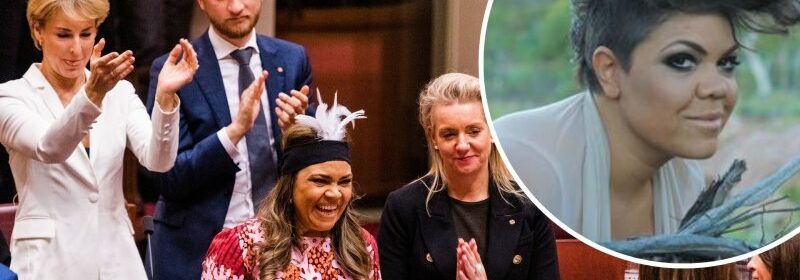The rapid rise of Jacinta Nampijinpa Price, Peter Dutton’s anti-Voice champion

Save articles for later
Add articles to your saved list and come back to them any time.
In her first speech in the Senate last July, Jacinta Nampijinpa Price railed against what she described as pointless virtue signalling, saying nothing would help Indigenous children facing the “nightmare of terror” posed by sexual violence.
Pitching the Voice as a vain proposal that would drive a wedge between black and white Australia, the firebrand new senator in a traditional Warlpiri headdress made the Canberra establishment sit up and take notice of her sharp rhetoric.
Liberal senator Jacinta Price shortly after delivering her maiden speech.Credit: James Brickwood
Fast-forward 10 months and Price, still loudly prosecuting the same arguments, has vaulted to become one of the most prominent Indigenous figures in the country as the opposition’s Indigenous Affairs spokeswoman and a leader of the campaign to defeat the Voice referendum.
“I understand the trials and tribulations of those who are nearest and dearest to me and I will continue to fight for those marginalised Australians,” she said at a press conference on Tuesday.
“They don’t know what the Voice is. They don’t feel like they will be represented by yet another model that they see as being run by those who had long-held positions within the Aboriginal industry.”
She is the daughter of Bess Price, a Country Liberal Party MP who supported the Howard government’s intervention in the NT. She had a little-known career as a musician, initially as a hip-hop artist before releasing a 2013 album – Dry River, a mix of folk and soul that was featured on Triple J, drawing comparisons to singer-songwriter Tracy Chapman.
Price, whose father is white, entered the political arena as a councillor on the Alice Springs Town Council. Her campaign against domestic violence led to her nomination as the Country Liberal Party candidate for the federal seat of Lingiari in 2019. She lost that poll but entered the Senate three years later.
Her uncompromising approach to Indigenous issues might rankle Liberal moderates who are open to the Voice, but it undoubtedly emboldens the No campaign. Many MPs expected her to be appointed to a more junior position than the one she secured on Tuesday.
One of the anti-Voice campaign leaders, Labor-turned-Liberal figure Warren Mundine, praised Dutton’s decision, claiming it gave the No campaign a better chance of success.
Jacinta Price in her days as a folk singer. Credit: ABC
“She’s now the shadow minister. That shows the Liberal Party under Dutton is definitely a ‘No’ Liberal Party,” he said, adding that he believed the referendum was on track to fail.
“What a vision: two Aboriginal women [Price and Kerrynne Liddle] are going into the cabinet, both strong No supporters.“
The ambitious 41-year-old is a fierce critic of what she calls the elite Indigenous establishment; a group she asserts will be financially and politically rewarded by the creation of the Voice advisory body.
Her labeling of the Voice as a bureaucratic, top-down body drew praise from fellow Indigenous senator Lidia Thorpe in January, before Thorpe left the Greens to kickstart her own campaign against the Voice, arguing it was not radical enough.
“Both of us in our collective experience have seen numerous advisory bodies try and fix things and fail. She has also seen the handpicked spokespeople for our people, who she doesn’t agree with, and nor do I,” Thorpe told this masthead at that time.
But mainstream Indigenous leaders flatly reject her arguments, pointing to overwhelming support for the Voice in Indigenous communities, which is supported by public polling.
Voice architect Noel Pearson has no time for her, and their disagreement has been abrasive and personal. Last year he claimed Price was being used by right-wing think tanks to “punch down on other black fellas”.
Price condemned the remarks as “ugly”. “We didn’t need a crystal ball to know that if you do not agree with the Voice to parliament, you will be called names,” she responded.
Thomas Mayor, a unionist and Yes campaign leader, doubts that Price legitimately listens to Aboriginal people on the ground.
“I can’t imagine we would speak with her,” he said of the mainstream Indigenous advocacy community who support the Voice.
Mayor said voters were more interested in the referendum proposal and its practical implications than Price and Dutton’s political manoeuvres.
Liddle, a Liberal senator from Alice Springs, has worked alongside Price since they were both elected in May. She was also promoted on Tuesday, and is now the Coalition’s spokesperson for child protection and family violence.
Liddle said Price had been focussed on the welfare of Aboriginal people for much of her career.
“[Price has] the commitment, enthusiasm, willingness to interrogate the issues, the willingness to push back when she feels people aren’t paying appropriate attention,” Liddle said.
Former Liberal operative Tony Barry said Dutton was taking a risk in promoting Price, though it might pay off.
“In this case the reward is that Senator Price is a very articulate and powerful advocate with lived experience who can punch holes through the details of the proposal,” the director at Redbridge political consultancy said.
“The risk is she overreaches by playing to the Sky After Dark crowd instead of focusing on message discipline, repetition and reach.”
Cut through the noise of federal politics with news, views and expert analysis from Jacqueline Maley. Subscribers can sign up to our weekly Inside Politics newsletter here.
Most Viewed in Politics
From our partners
Source: Read Full Article

